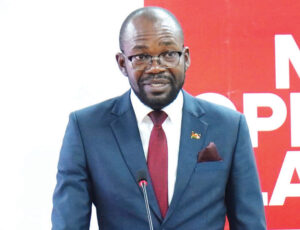
By Mercy Matonga:
The government has announced that it will continue using the current emergency fuel response mechanism with Kenya while finalising a government-to-government arrangement with the United Arab Emirates (UAE) this year.
This decision follows the recent procurement of 51 million litres of fuel through the Kenyan government to address the country’s fuel crisis.
According to recent communication from the Ministry of Energy, the fuel consignment was procured under a bilateral agreement between the governments of Kenya and Malawi, utilising Kenya’s existing government-to-government arrangement with Abu Dhabi.

Minister of Information and government spokesperson Moses Kunkuyu said in an interview with The Daily Times Monday that the immediate priority is to resolve the country’s fuel shortages while working on the long-term government-to-government agreement with the UAE.
“The government’s primary interest is to quickly overcome the current situation, restock our reserves, and stabilise the fuel supply in the country,” Kunkuyu said.
He also mentioned that the government would soon provide further updates to the media on the matter.
Meanwhile, Malawi Energy Regulatory Authority Chief Executive Officer Henry Kachaje separately told The Daily Times that the government would continue procuring emergency fuel supplies as needed until the shortages are sustainably resolved.
“We have used the Kenya-Malawi government-to-government procurement as an emergency response to the crisis.
“However, processes are already underway for Malawi to establish its own direct government-to-government agreement with oil-producing states. This will serve as Malawi’s primary long-term fuel procurement arrangement,” Kachaje said.
He further claimed that the current arrangement benefits the country by offering more flexible payment terms, with 180-day Letters of Credit, compared to the current 90-day terms with suppliers.
“This extended payment period will give Malawi sufficient time to mobilise the necessary foreign exchange for fuel purchases, easing pressure on forex demand and allowing other sectors to access foreign currency,” Kachaje said.
Malawi expects an improved fuel supply this week following the arrival of 51 million litres of fuel last week in Tanzania.
The country has been grappling with persistent fuel shortages for several months, a crisis that has heavily impacted the economy and daily life.
The root cause of these shortages is primarily linked to forex challenges as the reserves have been under pressure due to various economic factors, including high import bills, limited export revenues and the depreciation of the kwacha.
The shortage of forex has made it increasingly difficult for the government and private fuel suppliers to secure the necessary imports of fuel, leading to disruptions in the supply chain.
As a result, filling stations across the country have been unable to consistently stock sufficient fuel, causing long queues, inflated prices on the black market and widespread inconvenience for consumers.




0 Comments